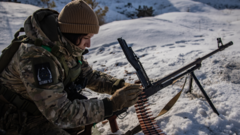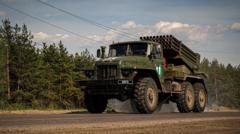The recently signed agreement offers hope for peace in a long-standing conflict exacerbated by territorial disputes and foreign involvement.
Peace Agreement Signaled Between DR Congo and Rwanda Amid Ongoing Conflict

Peace Agreement Signaled Between DR Congo and Rwanda Amid Ongoing Conflict
A historical pact aims to address sovereignty disputes as violence continues in the region.
In a significant diplomatic move, representatives from the Democratic Republic of Congo (DR Congo) and Rwanda have come together in Washington to sign an agreement that underscores their commitment to respect each other's sovereignty and to formulate a comprehensive peace deal by May 2. The event, which included the presence of U.S. Secretary of State Marco Rubio, marks an important step in addressing an ongoing crisis that has seen communities in eastern DR Congo devastated by violence and displacement.
The situation has deteriorated in recent months, particularly with the rise of the M23 rebel group, which is reported to be backed by Rwanda. This militia has claimed control over key territories in eastern DR Congo, including the major cities of Goma and Bukavu, leading to the displacement of hundreds of thousands of civilians. The Congolese government, acknowledging its loss of territory, has sought support from the U.S. in return for access to valuable mineral resources.
The newly forged agreement is seen as a hopeful sign since the relationship between the two nations has historically been fraught with tension and mutual accusations. The deal’s language suggests optimism for future investments, spurred by U.S. involvement and private sector engagement. However, reports indicate that clashes continue in North Kivu province, complicating the path toward lasting peace.
In a troubling backdrop to these negotiations, approximately 7,000 people have been reported killed in the conflict since the beginning of the year, as the M23 launched an aggressive offensive that raises fears of a wider regional war. While DR Congo has accused Rwanda of providing military support to the rebels—an allegation denied by Kigali—the complexities of the situation underscore the urgent need for a sustainable resolution to the conflict.
The situation has deteriorated in recent months, particularly with the rise of the M23 rebel group, which is reported to be backed by Rwanda. This militia has claimed control over key territories in eastern DR Congo, including the major cities of Goma and Bukavu, leading to the displacement of hundreds of thousands of civilians. The Congolese government, acknowledging its loss of territory, has sought support from the U.S. in return for access to valuable mineral resources.
The newly forged agreement is seen as a hopeful sign since the relationship between the two nations has historically been fraught with tension and mutual accusations. The deal’s language suggests optimism for future investments, spurred by U.S. involvement and private sector engagement. However, reports indicate that clashes continue in North Kivu province, complicating the path toward lasting peace.
In a troubling backdrop to these negotiations, approximately 7,000 people have been reported killed in the conflict since the beginning of the year, as the M23 launched an aggressive offensive that raises fears of a wider regional war. While DR Congo has accused Rwanda of providing military support to the rebels—an allegation denied by Kigali—the complexities of the situation underscore the urgent need for a sustainable resolution to the conflict.
















